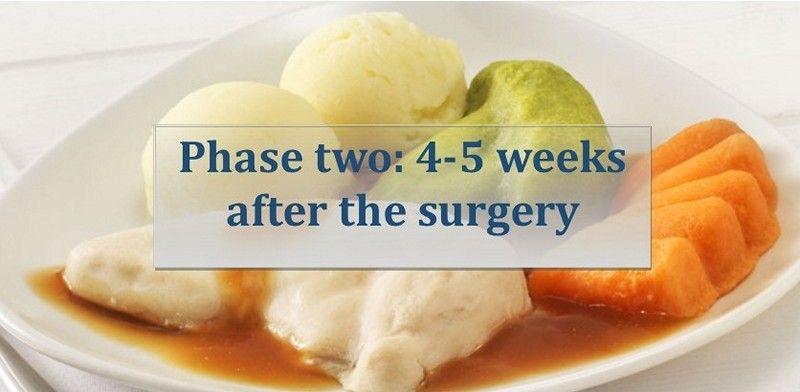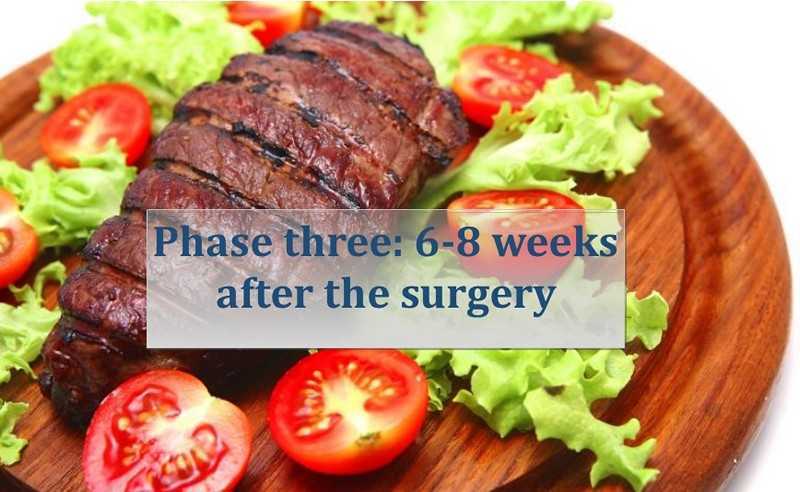Diet After Weight Loss Surgery Adapted to the Lebanese Population: Gastric Sleeve Diet, Gastric Bypass Diet, Gastric Band Diet, Gastric Plication Diet
1- Only four to six small meals should be consumed each day:
Your new stomach pouch can only hold half a cup of food, and if you try to consume more than this you will either vomit or feel ill. You must avoid frequent vomiting because it can create complications like stomach burst and stomach slippage. You will have to become aware quite quickly just how little your new stomach can safely hold.
2- Teach yourself to eat slowly and chew thoroughly:
Following the initial five week period you will be starting solid food, so be very careful to chew your food at least forty times per mouthful, until it has become mushy consistently. Allow enough time to eat your meal slowly, at least thirty minutes, and only swallow small amounts of food. If you should swallow a large piece of food, it could block the opening to your new stomach and you could vomit or experience pain.
3- The moment you start to feel full, stop eating:
Eating slowly will help you know when you have eaten enough. Do not hurry your meal – otherwise you could eat more than you actually needed. You will soon recognize the feeling of fullness, and will know when to stop.
4- Serve all your meals on a small plate:
This is an excellent method to control portion sizes. Use small plates and utensils.
5- Begin with proteins:
Always begin your meal with the protein portion, followed by vegetables, finishing with grain products. Low fat sauces, broths, gravies and tomato-based sauces should be added to help moisten the meats. You will be able to process your proteins much more easily by adding a sauce, so try cooking proteins in broths or liquids. The Crock-pot style of cooking would be perfect. If you still have trouble with meats, you can tenderize them with a meat tenderizer or a meat mallet, and then cut against the grain into small bite-sized pieces.
6- Savour and enjoy your meals:
Try and avoid distractions during meal times. Do not watch television, read, email or text whilst eating.
7- Avoid drinking liquids while eating:
For the rest of your life now you must only eat at mealtimes, and have your liquids half an hour before a meal and an hour after a meal. Drinking with your meal would completely defeat the purpose of your surgery.
8- Drink at least 6 – 8 glasses of liquid every day in order to prevent dehydration:
You will know if you are drinking enough by looking at your urine. If it is a light tea colour then you are drinking enough. If it is dark brown, then you need to drink more. Drink only water, decaffeinated tea or coffee (no added cream), low-calorie flavoured water or milk, and herbal teas. Avoid all caffeinated drinks like soft drinks, alcohol, fizzy drinks, and juices.
9- Begin your new eating regime by trying one new food at a time:
As you go through each stage after your surgery, add a new food to your diet. This way you will know what the culprit is, should a certain food cause problems.
10- Do not lie down after eating:
This will prevent gastric or acid reflux, which is a burning sensation in your chest.
11- For Gastric Bypass and duodenal switch surgery, every day for the rest of your life you will be taking vitamins:
If you have any problems with the prescribed vitamins, you should report this to your bariatric dietitian to see what alternatives can be worked out.
IMPORTANT TO KNOW
- To prevent dehydration, take frequent small sips of water.
- Check the colour of your urine. If it is a dark red-brown colour then you need to drink more water.
- With food, consume no more than two tablespoons over a 10 – 15 minute period. Using a teaspoon will prevent you from eating too much at one time.
- As soon as you feel full, stop eating.
- It is not recommended that you drink tea and coffee. When taken with food they reduce iron absorption, and they have almost no nutritional value.
THE FIRST TWO WEEKS DANGER SIGNS
- Abdominal pain that is not relieved by Tylenol
- A temperature of over 38.5 degrees Celsius
- Vomiting blood
- Being very short of breath while doing minimal activity
- Warm and painfully swollen calves
- General feeling of uneasiness
VITAMINS AND SUPPLEMENTS
Because the duodenum has now been bypassed, in some patients this can be the cause of metabolic bone disease. The results are bone pain, humping of the back, loss of height, and fractures of the hipbones and ribs. Ensure that you consume foods that are rich in nutrients – taking vitamin supplements may also assist in avoiding these problems. Some patients experience chronic Vitamin B12 deficiency; however, this can be well managed with injections or vitamin B12 tablets.
The following supplements and vitamins could assist in your recovery following surgery:
- A multivitamin with minerals, taken every day.
- Calcium citrate 600mg with added Vitamin D, twice daily.
- 1,000 mcg B12 under the tongue twice per week, or alternatively, 500 mcg tablet swallowed once per day.
- 50 – 66mg elemental iron every day for menstruating women or people with anaemia. Ferrous fumarate with Vitamin C 250mg can also be taken to improve the absorption of iron.
- Sometimes you will need more vitamins or supplements. This will be decided by Dr Safa.
HELPFUL TIPS:
- Calcium should be taken in individual doses throughout the day. Don’t take it within 1 -2 hours of other medication because the calcium will interfere with their absorption; avoid taking it with an iron supplement.
- Calcium Citrate is quite large to swallow, so try cutting it into a few pieces, or dissolve it in water. There are also chewable Calcium Carbonate tablets that can be taken for the post op period.
- Before you go to bed each night take your chewable Multi-Vitamin with Minerals; take your B12 before breakfast. Do not use the pill form – use only a ‘sublingual’ B12 tablet. This is more suitable following gastric bypass surgery because it dissolves under the tongue.
ACTIVITY AND MENTAL CONDITION
Motivation and Self Control: You have taken such a huge step towards achieving your weight loss goals by deciding to have the surgery for weight loss. But now you must remain motivated, by continuing your exercise routine and exerting self-control when it comes to your special diet.
Foods to avoid after Weight Loss Surgery
| Food Product | Examples | Consequence |
|---|---|---|
| Concentrated sweets | Sugar, juice, pastries, cookies, cake, ice cream, candy, chocolate bars, honey, maple syrup, jam, etc. | Dumping syndrome, Reactive hypoglycemia, weight gain. |
| Greasy / High fat foods | Fatty meats, skin on poultry, bacon, sausage, added fats, (i.e. butter, excess oil), heavy cream sauces, fried foods, etc. | Dumping syndrome, weight gain. |
| Carbonated beverages | Soda, mineralized water, sparkling water, beer, etc. | Increase size on gastric pouch |
| Caffeine | Coffee, tea, chocolate, energy drinks, etc. | Diuretic, fluid loss. |
| Alcohol | Beer, wine, spirits, etc. | Irritation to digestive system, weight gain. |
| Soft ‘doughy’ grain products | Untoasted breads, pasta, rice, etc. | Dysphagia (‘stuck’ feeling when swallowing). |
| Fibrous foods | Nuts, popcorn, celery, artichoke, etc. | Better to delay consumption until tolerance improves. |
| Caffeine | Coffee, tea, chocolate, energy drinks, etc. | Diuretic, fluid loss. |



